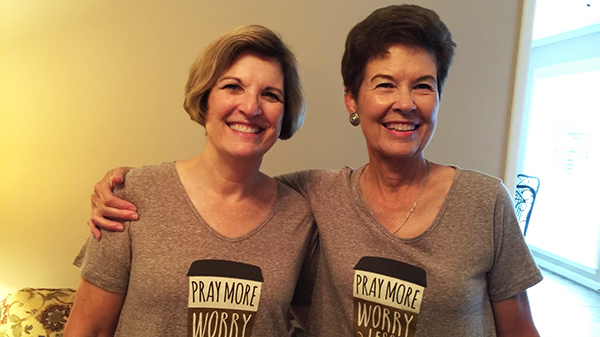Associate professor of psychology and counseling and director of clinical training
New Orleans Baptist Theological Seminary
Are you anxious about your children? Are you worried that they will not succeed or that they will not be happy? Do you ever hover over your children, managing every aspect of their life and becoming so hyperfocused that you lose sight of the identity and individual developmental process that each child must experience?
God’s Word gives us specific guidelines and principles to protect us from the hyper-focus on our children that can be more destructive than helpful to our offspring. Three principles are essential for us to avoid this hyperfocus.
- The first principle is to avoid making the success or happiness of your children the primary focus of your life. In Exodus 20:2, God commands that we not have any other gods before Him.
Focus on God
When we love our idols we embrace and devote ourselves to them while making it our business to please them. Does that sound like a hyperfocused parent?
Deuteronomy 6:5 reminds us to “love the Lord your God with all your heart.” Our God is a jealous God and does not want our children to be more of a focus in our lives than He is. Jesus described this same principle in Luke 14:26: “If anyone comes to Me and does not hate his father and mother, his wife and children, his brothers and sisters — yes even his own life — he cannot be My disciple.” Jesus was not commanding us to hate our family members. Instead He is saying our love for Him must be so great that our love for family members seems to be like hate. Only by loving God with all our heart can we truly love our children in a healthy way. Find your greatest joy in thinking about God, meditating on His words, talking to others about Him, praising Him and giving Him thanks. Then you will delight in Him and not in your children (Ps. 37:4).
- The second principle is to follow God’s model of being a loving parent. God notices we are hurting and shows us compassion. Psalm 56:8 says He catches our tears. Parents must learn to be aware and sensitive to their children. This means accepting their negative and positive emotions and helping them express those emotions in a healthy way.
God’s presence with us is consistent but not overbearing. He does not protect us from painful circumstances nor does He always protect us from suffering. He allows us to fail and to make wrong choices, but He never leaves us (Ps. 139:1–12).
God is an incredible listener and always has time to listen to us. In Genesis 16:11–13, God listened to Hagar’s cry and saw her need. He told her to name her son Ishmael, which means “God who hears.” After Hagar and Ishmael are cast out, God’s messenger tells Hagar that “God heard the boy crying” and provided his needs (Gen. 21:17–18). Over-involved parents often have their own ideas of what they want to happen in the lives of their children and, as a result, they may not really listen to their children. Listening to and understanding the hurts or frustrations of your child’s heart is an important component of their feeling loved and accepted.
- The third principle is to follow God’s model of loving control in the lives of His children.
God responds to us with the “fruit” of His character. Love is the fruit of His character and some of the expressions of God’s love include joy, peace (the opposite of anxiety), patience, kindness, goodness, faithfulness, gentleness and self-control (Gal. 5:22–23). Parents may struggle to demonstrate these traits when our children fail to meet our expectations. However, we must put our expectations in God, not in our children and not in others who interact with our children. God is in control. He alone is God.
God’s love includes allowing us to suffer. In “Effective Parenting in a Defective World,” Chip Ingram emphasizes the importance of teaching our children to suffer well. To teach your child to suffer well, first find out what they are concerned about then pray about it. Don’t minimize it. Second align Scripture with their suffering. Help them to see how people suffered in Scripture and how God responds to suffering.
Finally help your child understand suffering is normal. This reinforces their faith in God’s goodness and challenges them to see that God uses their suffering for good (Rom. 8:28). Allowing children to fail and experience suffering is a crucial part of their healthy growth and development spiritually.
God’s love balances control with warmth. Help your child understand that boundaries are meant to teach, not to punish. This means parents should avoid setting limits out of anger or frustration. Healthy control includes taking a child’s wishes and interests into account, not just laying down the law without discussion or explanation. The “automatic no” teaches children that their preferences and desires do not matter. Yet God tailors His pathway for each of us, and if He directs us to carry out a task, He makes sure He has prepared us for that task. We should respond to our children the same way.
Balancing love and control
Perhaps one of the most powerful tools God uses to teach and shape us is the family. His patience and longsuffering with us is amazing. He never gives up on us, but He does give us boundaries and consequences, as we need to have with our children. May God’s model of balancing love and control be the example we follow in parenting our children.
__________________________________________
Helpful resources
- The Power of a Praying Parent, by Stormie Omartian, Harvest House (2014)
- The Power of Praying for Your Adult Children, by Stormie Omartian, Harvest House (2014)
- Prayer Without Limits: Expanding Your Relationship with God, by Elaine Helms, New Hope Digital (2015)
- Mothers of the Bible Speak to Mothers of Today, by Kathi Macias, New Hope Digital (2009)
- Setting Up Stones: A Parent’s Guide to Making Your Home a Place of Worship, by Martha Singleton and Greg Singleton, New Hope Digital (2008)
- Modern Parents, Vintage Values: Instilling Character in Today’s Kids, by Sissy Goff and Melissa Trevathan, B&H (2010)
- The Parent Adventure: Preparing Your Children for a Lifetime with God, by Scott McConnell, Selma Wilson and Rodney Wilson, B&H (2009)





Share with others: